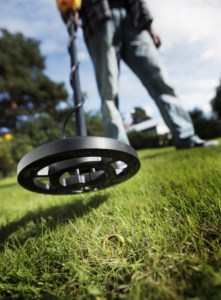
What is a metal detector, and what are they really about?
A metal detector is an electronic instrument that can detect the presence of metals and minerals that are nearby. This device, when used as a hobby, can help you find hidden treasures, such as lost jewelry and coins. Some metal detectors can find valuable precious metals, such as gold.
Professional metal detectors are also used for safety purposes.
If you’ve always wanted to get out and explore, but need some motivation to do so, then metal detecting could be the perfect hobby. You’ll get some exercise, a chance to enjoy the outdoors, and potentially make some money doing so.
The Best in One Simple Chart
Metal detectors come in many different shapes and sizes. Each detector offers a unique user experience. These are the models that provide a consistently good experience over time in each category.
| Picture | Name | Our Rating | Good For | Maximum Coin Depth | Weight | Price |
|---|---|---|---|---|---|---|
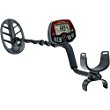 | Bounty Hunter Land Ranger Pro Metal Detector | 4.3 | Overall | 10 Inches | 3 pounds | $$$$ |
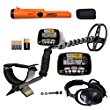 | Garrett AT Gold Waterproof Metal Detector | 4.9 | Gold | 10 Inches | 6.7 pounds | $$$$$+ |
 | Fisher Gold Bug Metal Detector | 4.6 | Gold | 18 Inches | 4.5 pounds | $$$$ |
 | Minelab X-Terra 705 Gold Pack Metal Detector | 4.2 | Gold | 2.2 pounds | $$$$$+ | |
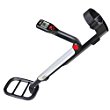 | National Geographic PRO Series Metal Detector | 4.6 | Coin | 10 Inches | 2.3 pounds | $$ |
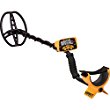 | Garrett ACE 400 Metal Detector | 4.8 | Coin | 8 Inches | 7.3 pounds | $$$$$ |
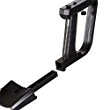 | OUTAD MD-4030 Metal Detector | 4.8 | Coin | 6.5 Inches | 2.7 Pounds | $ |
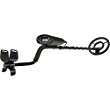 | Bounty Hunter TK4 Tracker Metal Detector | 4.4 | Beginner | 8 Inches | 4.2 pounds | $ |
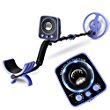 | Intey Lightweight Multi-Function Metal Detector | 4.8 | Beginner | 7 Inches | 4 pounds | $ |
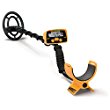 | Garrett Waterproof Detector | 4.8 | Beginner | 6.5 Inches | 4.59 pounds | $$$ |
| Picture | Name | Our Rating | Good For | Maximum Coin Depth | Weight | Price |
Why Would I Want One?
A metal detector is a handheld tool that utilizes magnetic fields to locate buried metals and minerals. It supplies a current to an inductor coil on the device and the movement of the field creates an electric current when it comes across an object. In return, a new magnetic field is formed by the located item and this generates a signal to the user that something has been found.
Most metal detectors for personal use have a single-coil design, but multiple coils are possible. A stronger magnetic field gives you more depth penetration to find smaller objects at larger depths.
This tool is used to discover what is hidden beneath sand or soil. Some models offer waterproof coils so they can be used in streams, creeks, or even lakes. You can even use a metal detector along a coastal beach to find unique treasures.
For those who enjoy this hobby, the most valuable items that are found commonly tend to be coins. Nickels, pennies, and quarters are easily detected by a modern metal detector at depths which range between 6-12 inches. You may also find lost jewelry from time to time.
A gold metal detector can be used to locate veins, nuggets, or flakes that are close to the surface as well. Larger deposits can be found up to 3 feet below the surface with some of the best metal detectors that are on the market today.
What Are the Benefits of Using a Metal Detector?
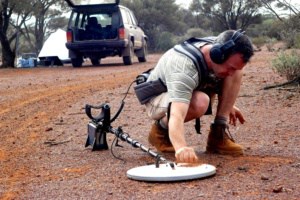
A metal detector is an affordable tool that can help you start a new hobby. They are often used to find coins and do beach combing, but numerous items can be found with a metal detector. It can find anything from a stray bullet to a lost button to a class ring that fell off while taking a walk.
Metal detecting is also a fun way to get some exercise. You’ll be walking with your detector as you cover the ground. There will be lots of stooping as you get an alarm because you’ll need to dig out the item.
You’re also joining a community of people who enjoy this activity when you purchase your first metal detector. Numerous clubs exist around the world that bring people together. You’ve got an opportunity to make new friends, talk about the things that you’ve found, or have a conversation starter when you’re out exploring.
Metal detecting is also a way to keep your focus sharp as you’re exploring. The more you challenge yourself, the better your brain can maintain its current mental capacity. It embraces the imagination, making you wonder what you might find that day. It teaches patience. It requires perseverance.
There is also the potential of making money with this equipment. Let’s face it: if you could find one gold nugget or one lost rare coin, this tool would pay for itself immediately.
Where Can I Use a Metal Detector?

Metal detectors can be used in virtually any public place. You’ll often find people bring their metal detectors to a local park, picnic area, beach, or campground.
Heavily travelled areas offer a lot of opportunities to find lost items. People drop change from their pockets or purses all the time. Rings get lost in tall grass. Earrings fall off without notice. These are all opportunities to find something of value or reunite someone with a lost item that they love.
Using your metal detector in the early morning tends to be the best time. Fewer people are around to interfere with your hobby and mornings tend to be less busy than twilight hours.
You might also consider using your metal detector in areas that are described by metal detecting clubs as being “lucrative.”
- Farm fields that have been recently plowed.
- Ghost towns, ruins, or old settlement sites.
- Pastures
- Forests or woodlands.
- Older homes that are open to the public.
- Piers or jetties.
- Sports fields.
Some metal detecting clubs will also recommend exploring old military forts or battlefields with your new equipment. These locations should be explored at your own risk. Amazing artifacts could be found, but so could potentially dangerous items.
Unexploded ordnance lingers long after a battle. It might be fun to find some old shell casings, uniform relics, or similar memorabilia. It wouldn’t be as much fun to find a grenade that hadn’t exploded.
You may also wish to take your metal detector into the mountains, especially if there are old gold mines near your location. Tailings from old mines can be a treasure trove of missing gold. Old diggings can help you find old coins that may have rarity value to them.
Take along gold panning kits and sluice boxes to fully explore opportunities for prospecting that may be available to you.
Factors to Consider When Looking at Detection Depth
How deep a metal detector goes depends on a number of specific factors.
- Ground Mineralization. Targeted items on grounds that have a low mineral content can be detected at a greater depth when compared to items that are in grounds with a high mineral content.
- Target Size. Larger items can be detected at lower depths than smaller items. It’s easier to find a quarter at 10 inches, for example, when compared to a dime.
- Target Shape. Metal detectors tend to do a better job of finding flat and round items at deeper depths when compared to items that are long and flat, such as a nail.
Certain materials conduct better than others as well when using a metal detector. It’s easier to find items that are composed of a precious metal, such as gold, silver, or copper, than it is to find items that have low conductivity, such as lead.
How the item is orientated in the ground matters as well. Coins that are positioned vertically are more difficult to detect at any depth when compared to a con that that is positioned flat, or horizontally. This YouTube video is a great resource on the topic.
Do I Need Waterproof Coils?
Almost every coil that is produced for a modern metal detector is intended to be waterproof. Only on the very basic, entry-level models will the coil not be waterproof. It is a good idea to invest into this feature because any moisture exposure could damage the unit and make it unworkable.
Water damage to a coil that isn’t waterproof may also void the product’s warranty.
Even if you own a metal detector with a waterproof coil, however, you just can’t buy it and then forget about it. Regular maintenance is required to ensure that the detector is operating as it should.
Inspect the metal detector where your wiring goes into the top of the coil. You’ll want to inspect the seams on the edge of the coil as well. These are common places where leaks can develop, allowing moisture to interfere with the detection process.
If you have any concerns about these structures, it is better to use a sealant on them to reinforce the water resistance feature of the metal detector.
A standard RTV sealant will usually do the job. Make sure to follow the manufacturer’s instructions in this area of maintenance, however, to make sure that you receive the intended results.
How Much Does a Metal Detector Cost?
Metal detectors can be very affordable. The best metal detectors that are made for serious hobbyists or those who earn a living from finding gold or lost items can also come with a premium price tag.
Beginner metal detectors are often priced below $100. Some models are even less than $50. This type of metal detector has limited capabilities, but will generally find coins that are buried to a depth of 4-6 inches.
A professional-quality metal detector is often priced above $500. Several models are priced above $1,000. Premium metal detectors can find coins buried up to 12 inches and may find larger metal deposits at depths of 4 feet or more.
Best Metal Detectors Reviewed Right Now
Our pound-for-pound best value pick for a metal detector.
Bounty Hunter Land Ranger
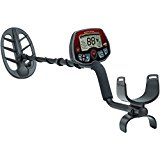 This metal detector does everything you’d want a high-quality model to provide. It offers a variable tone breakpoint, a pinpoint mode that includes a depth indicator, and has computerized ground balancing. An adjustable audio tone is part of the design as well, giving you a specific alert when you’ve discovered iron so you don’t need to waste your time digging. It weighs just 2.4 pounds, has an adjustable length, and a 0-99 target ID. 7 modes of operation give you full personalization. It even detects gold and works in freshwater or saltwater locations.
This metal detector does everything you’d want a high-quality model to provide. It offers a variable tone breakpoint, a pinpoint mode that includes a depth indicator, and has computerized ground balancing. An adjustable audio tone is part of the design as well, giving you a specific alert when you’ve discovered iron so you don’t need to waste your time digging. It weighs just 2.4 pounds, has an adjustable length, and a 0-99 target ID. 7 modes of operation give you full personalization. It even detects gold and works in freshwater or saltwater locations.
Click here to find the best price on Amazon.
Our best gold metal detectors.
Garret AT Waterproof Gold Metal Detector
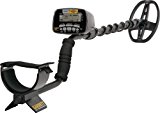 This metal detector is waterproof up to 10 feet. The 5×8 DD search coil is designed to help you find the small gold nuggets that could be lingering just beneath the surface, making it easier to prospect in the best locations. You can even use this metal detector in streams or creeks to find the right spot to pan or use your sluice box. Two discrimination modes are included with this model as well, letting specifically look for gold or search for all metals with its general search mode. It really does a consistently good job.
This metal detector is waterproof up to 10 feet. The 5×8 DD search coil is designed to help you find the small gold nuggets that could be lingering just beneath the surface, making it easier to prospect in the best locations. You can even use this metal detector in streams or creeks to find the right spot to pan or use your sluice box. Two discrimination modes are included with this model as well, letting specifically look for gold or search for all metals with its general search mode. It really does a consistently good job.
Click here to find the best price on Amazon.
Fisher Gold Bug
 This metal detector gives you the gain and threshold adjustments that you sometimes need to find those small treasures that are hiding on you. It features a large LCD screen that gives you a numeric target identification display. Combined with the audio alerts, you can know what you’ve found and if you wish to pursue it. The computer-assisted ground grab and balance gives you an excellent user experience as well. It is balanced well, supportive to eliminate arm fatigue, and offers a sensitive 2-tone VCO that will make prospecting fun for anyone of any skill or age.
This metal detector gives you the gain and threshold adjustments that you sometimes need to find those small treasures that are hiding on you. It features a large LCD screen that gives you a numeric target identification display. Combined with the audio alerts, you can know what you’ve found and if you wish to pursue it. The computer-assisted ground grab and balance gives you an excellent user experience as well. It is balanced well, supportive to eliminate arm fatigue, and offers a sensitive 2-tone VCO that will make prospecting fun for anyone of any skill or age.
Click here to find the best price on Amazon.
Minelab X-Terra 705
 It’s the VFLEX technology that makes this fantastic metal detector stand out from the rest of the competition. The 7 accessory coils can be used with 6 coil options so you have plenty of flexibility for your prospecting. Most of the false ground noises are eliminated with this model too, even when compared to other models that offer a ground balance. You can also manually change your balance settings to further reduce interference. It also provides tracking, beach, and automatic settings so you can get the most out of this investment.
It’s the VFLEX technology that makes this fantastic metal detector stand out from the rest of the competition. The 7 accessory coils can be used with 6 coil options so you have plenty of flexibility for your prospecting. Most of the false ground noises are eliminated with this model too, even when compared to other models that offer a ground balance. You can also manually change your balance settings to further reduce interference. It also provides tracking, beach, and automatic settings so you can get the most out of this investment.
Click here to find the best price on Amazon.
Our best coin shooting detectors.
National Geographic PRO Series
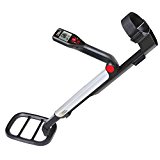 This affordable metal detector offers three different detecting modes. There are 4 different sensitivity levels. It even includes a pinpoint mode so you can find coins that are buried up to 10 inches deep. You can distinguish trash or unwanted items easily with this metal detector as well thanks to its small, but effective LCD display. The coil is waterproof and the entire unit weighs just a pinch over 2 pounds. For storage, it can collapse to 22 inches in length or be used at that length, making it a good option for kids as well.
This affordable metal detector offers three different detecting modes. There are 4 different sensitivity levels. It even includes a pinpoint mode so you can find coins that are buried up to 10 inches deep. You can distinguish trash or unwanted items easily with this metal detector as well thanks to its small, but effective LCD display. The coil is waterproof and the entire unit weighs just a pinch over 2 pounds. For storage, it can collapse to 22 inches in length or be used at that length, making it a good option for kids as well.
Click here to find the best price on Amazon.
Garrett ACE 400
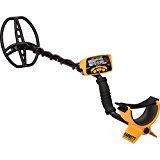 If you like to go out on a daily walk and want to bring a metal detector along, then this is the model to consider. It offers 5 search modes and a 10 kHz higher frequency that makes it easier to eliminate interference so you can find the coins that are underfoot. You’re able to modify the discrimination patterns with this model as well, letting you specifically find what you are seeking. It’s comfortable to carry, comes with a storage/carry bag, and offers a waterproof user experience.
If you like to go out on a daily walk and want to bring a metal detector along, then this is the model to consider. It offers 5 search modes and a 10 kHz higher frequency that makes it easier to eliminate interference so you can find the coins that are underfoot. You’re able to modify the discrimination patterns with this model as well, letting you specifically find what you are seeking. It’s comfortable to carry, comes with a storage/carry bag, and offers a waterproof user experience.
Click here to find the best price on Amazon.
OUTAD MD-4030
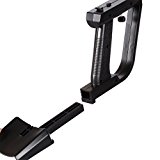 This is an excellent hobbyist metal detector that comes in at an entry-level price. Detected objects are shown on the detector’s LCD display. Kids can use it because its light and just their size, but adults will enjoy using it as well. It gets all the basics right that you need to have when hunting down coins. Adjust the tone volume, connect a pair of headphones if you want, and you’re ready to get to work. It does use the older swing pointer for metal discovery, however, so it does have some limitations to consider as well.
This is an excellent hobbyist metal detector that comes in at an entry-level price. Detected objects are shown on the detector’s LCD display. Kids can use it because its light and just their size, but adults will enjoy using it as well. It gets all the basics right that you need to have when hunting down coins. Adjust the tone volume, connect a pair of headphones if you want, and you’re ready to get to work. It does use the older swing pointer for metal discovery, however, so it does have some limitations to consider as well.
Click here to find the best price on Amazon.
Our best metal detectors for beginners.
Bounty Hunter TK4
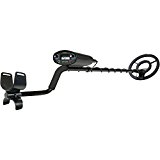 This is a rugged metal detector that can stand up to the wear and tear that a beginner can put on this type of equipment. It offers 3 modes, including a discrimination mode, so you can hunt specific treasures if you wish. The ground balance is surprisingly good for an entry-level model and it detects coins up to 8 inches deep. It will also detect gold, brass, and silver in addition to common metals like iron. The coil on this beginner’s model is even waterproof. The one downside is the weight, which is a bit over 4 pounds.
This is a rugged metal detector that can stand up to the wear and tear that a beginner can put on this type of equipment. It offers 3 modes, including a discrimination mode, so you can hunt specific treasures if you wish. The ground balance is surprisingly good for an entry-level model and it detects coins up to 8 inches deep. It will also detect gold, brass, and silver in addition to common metals like iron. The coil on this beginner’s model is even waterproof. The one downside is the weight, which is a bit over 4 pounds.
Click here to find the best price on Amazon.
INTEY
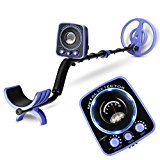 This metal detector gives you a vintage feeling, but with modern features. You have the old-school pointer display, but you can also take advantage of the discrimination mode to eliminate metals you don’t want to detect. The waterproof search coil functions well in shallow water. You can plug any headphones with a 3.5mm jack into the unit as well. The shaft of the detector is also adjustable, giving you a 30-centimeter range that lets kids or adults have fun with this hobby. This detector also comes with a shovel as part of its kit.
This metal detector gives you a vintage feeling, but with modern features. You have the old-school pointer display, but you can also take advantage of the discrimination mode to eliminate metals you don’t want to detect. The waterproof search coil functions well in shallow water. You can plug any headphones with a 3.5mm jack into the unit as well. The shaft of the detector is also adjustable, giving you a 30-centimeter range that lets kids or adults have fun with this hobby. This detector also comes with a shovel as part of its kit.
Click here to find the best price on Amazon.
Garrett ACE 200
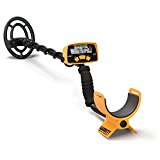 If you want one of the best metal detectors, then this brand is a solid choice. The entry-level model may be twice the price of other brands, but you receive twice the features as well. It offers a digital target identification, cam locks that give the stem better stability, and pulse-width modulation audio that is sharp and responsive. Headphones are included with this detector, which can find coins up to 6.5 inches deep. It’s a great value investment for those who want to take this hobby seriously.
If you want one of the best metal detectors, then this brand is a solid choice. The entry-level model may be twice the price of other brands, but you receive twice the features as well. It offers a digital target identification, cam locks that give the stem better stability, and pulse-width modulation audio that is sharp and responsive. Headphones are included with this detector, which can find coins up to 6.5 inches deep. It’s a great value investment for those who want to take this hobby seriously.
Click here to find the best price on Amazon.
The best metal detector reviews will help you find the right make and model for you to start hunting or prospecting. From gold to coins to whatever other hidden treasures may be lurking beneath your feet, these are the metal detectors that will help you find them. Purchase your new detector today and cash-in on this wonderful and potentially profitable hobby.
